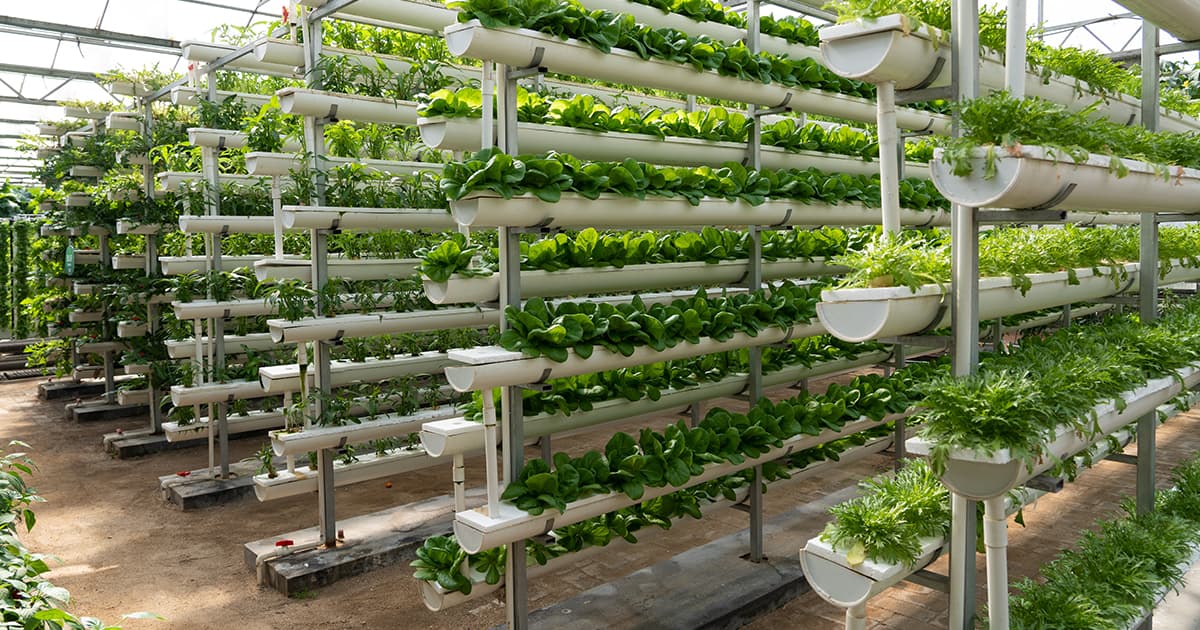What Kind of Insurance is Needed for Vertical Farming?

Growing crops in vertically stacked layers in greenhouses, warehouses, empty office spaces, and rooftops is a type of non-traditional farming. So, what kind of insurance does what’s known as vertical farming need?
It’s important to understand that alternative farming projects always require specialized comprehensive insurance coverage to protect against a variety of risks.
Remember that traditional farming involves planting crops in soil on open fields with natural sunlight and irrigation.
Vertical farming allows farmers to grow plants without the use of soil because soil can weigh down the plants that are vertically stacked. Instead, farmers use air and water to create a suitable artificial environment to support plant growth.
Urban vertical farming: needs detailed liability and property insurance, as it’s usually in close proximity to other projects, parks, or housing units.
Rural vertical farming: can be less complicated in terms of insurance needs, but still isn’t covered under most general farm insurance policies. Talking to a professional 1-on-1 about your specific set up is a must to get the right farm insurance.
Here are the key types of insurance for your vertical farming business:
1. Property insurance
Property insurance protects the physical assets of a vertical farming setup, including:
- Buildings and structures: Coverage for damage to the physical structures where farming and operations take place, whether owned or leased.
- Equipment: Protection for specialized farming equipment, such as lighting systems, hydroponic or aeroponic systems, climate control systems, harvesting systems, packaging tools, and other machinery.
- Inventory: Coverage for crops, seeds, fertilizers, and other materials stored on the premises.
2. Commercial general liability insurance
General liability insurance protects your farming operation from claims involving third-party (such as suppliers, customers, visitors) bodily injuries and third-party property damage. This coverage is essential and includes:
- Bodily injury: Coverage for injuries sustained by third parties while on the property.
- Property damage: Protection against claims of damage to other people's property caused by business operations.
- Legal fees: Coverage for legal costs associated with defending against claims.
3. Product liability insurance
This coverage protects against claims of illness or injury caused by customers consuming the produce you’ve grown. This will include:
- Contamination: Coverage for issues related to contaminated produce.
- Mislabeling: Protection against claims related to improper labeling or packaging.
- Recalls: Coverage for costs associated with recalling defective or harmful products.
4. Crop insurance
Crop insurance is designed to protect the value of the crops being grown. While traditionally associated with outdoor farming, there are specialized farm policies out there for indoor and vertical farming. This insurance covers:
- Weather-related Damage: Protection against losses due to unexpected weather events affecting indoor growing environments.
- Pests and Diseases: Coverage for losses resulting from pest infestations or plant diseases.
- Operational Failures: Protection against losses from equipment or system failures that affect crop growth.
5. Business interruption insurance
Business interruption insurance is recommended to all businesses. It helps cover the loss of income during periods when your farm cannot operate due to covered events, like natural disasters or supply chain issues. This type of insurance can save your alternative farm in case of:
- Natural disasters: Coverage for income loss during recovery from events like windstorms and severe weather events.
- Equipment breakdown: Protection for income loss due to critical equipment failure.
- Supply chain interruptions: Coverage for disruptions in the supply chain that affect production.
6. Environmental liability insurance
Environmental liability insurance is important for all businesses involved in agriculture, including vertical farming, to cover potential environmental damage. This includes:
- Pollution clean-up: Coverage for costs associated with cleaning up pollution caused by business operations.
- Third-party claims: Protection against claims of environmental damage affecting neighboring properties.
- Regulatory compliance: Coverage for fines or penalties resulting from environmental regulation violations.
Depending on where and how your set up is located, particularly for urban vertical farms, this may be an optional add on.
To get personalized insurance advice, contact our Western Financial Group farm insurance experts about your specific vertical farming operation.
Looking for more inspiration? Here are some notable vertical farming companies in Canada that you can check out! Most are willing to share detailed information about their set ups and business operations.
Lufa Farms
- Location: Montreal, Quebec
- Overview: Lufa Farms is known for building the world's first commercial rooftop greenhouse. They focus on sustainable urban agriculture, providing fresh, locally grown produce to urban residents.
GoodLeaf Farms
- Location: Guelph, Ontario
- Overview: GoodLeaf Farms specializes in indoor vertical farming, producing a variety of leafy greens year-round. They emphasize the use of advanced technology to optimize growth conditions and ensure high-quality produce.
Elevate Farms
- Location: Toronto, Ontario
- Overview: Elevate Farms focuses on large-scale vertical farming operations, aiming to produce sustainable and affordable fresh produce. They leverage automation and data analytics to enhance efficiency and crop quality.
Calgary Vertical Farms
- Location: Calgary, Alberta
- Overview: Calgary Vertical Farms focuses on sustainable urban farming practices, providing fresh produce to local communities. They utilize advanced hydroponic systems to grow a variety of crops indoors year-round.
Ecoation
- Location: North Vancouver, British Columbia
- Overview: Ecoation combines vertical farming with advanced AI and robotics to monitor and optimize plant health. Their technology aims to improve crop yield and quality while reducing environmental impact.



